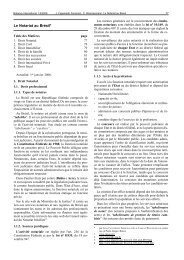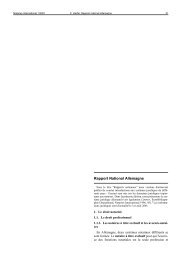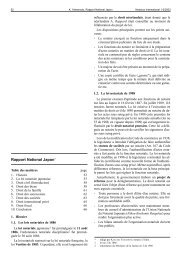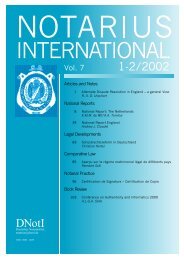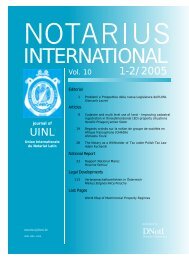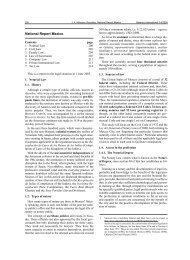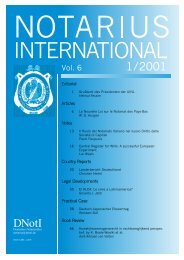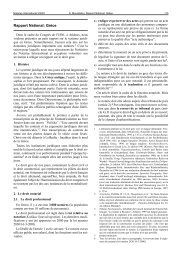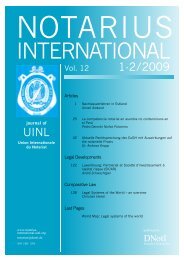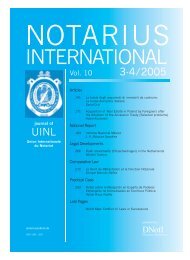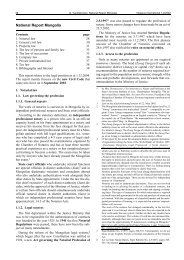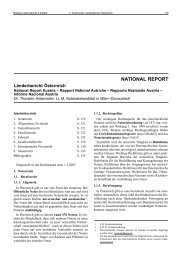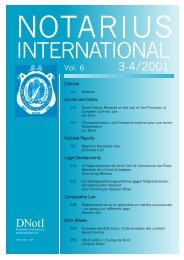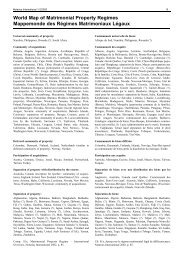ARTICLES and NOTES - Notarius International
ARTICLES and NOTES - Notarius International
ARTICLES and NOTES - Notarius International
Create successful ePaper yourself
Turn your PDF publications into a flip-book with our unique Google optimized e-Paper software.
220 C. Hertel, Preventive Consumer Protection <strong>Notarius</strong> <strong>International</strong> 3-4/2002<br />
1.2.3. Intellectual Fascination of the Harmonisation<br />
Process<br />
The vision of a European contract law is a fascinating<br />
idea for most European juristes. For the continental lawyer,<br />
the words harmonisation und codification brings up<br />
an idea of an heroic formative period of the law, be it the<br />
Code Napoleon for the French <strong>and</strong> others, be it the debate<br />
between Savigny <strong>and</strong> Thibault for the Germans, be it the<br />
work of Eugen Huber for the Swiss.<br />
1.2.4. European Identity<br />
It has also been argued, that a harmonised law would<br />
also serve in order to develop a common European identity.<br />
I am not sure, wether that is true. As a practitioner, I<br />
am very relieved to hear that the Commission does not try<br />
to follow such an abstract goal, but will develop European<br />
contract law only if there is an economic argument<br />
for the harmonisation.<br />
If we talk about European identity, I prefer the more<br />
down-to-earth argument, that a harmonized law might be<br />
easier to export <strong>and</strong> therefore better for the competition<br />
of legal cultures. Even now, the possible future European<br />
contract law is already taken into account as a frame of<br />
reference for legal reform, in particular in the Eastern<br />
European c<strong>and</strong>idate states 11 .<br />
1.3. Problems of European Contract Law<br />
Everybody knows the problems which have to be overcome<br />
for a future harmonisation of European Contract<br />
Law (ECL). Let me rephrase the well known problems in<br />
some catch phrases, before I discuss whether or not the<br />
same problems also exist for an optional instrument:<br />
- The academic community has been busy building the<br />
scientific base for ECL; however the base has not yet<br />
been completed.<br />
- Harmonisation cannot avoid hard choices.<br />
- Harmonisation will not stop with contract law.<br />
- Harmonisation requires a European judicial system.<br />
- Harmonisation requires a European lawyer.<br />
- Finally: Why do we need harmonisation of the European<br />
contract law at all Is not the existing UN<br />
Convention on the Sales of Goods sufficient for all<br />
practical purposes<br />
1.4. Optional Intrument as a Chance to test ECL<br />
With its timetable, starting first with a common frame<br />
of reference <strong>and</strong> continuing with an optional instrument,<br />
the Commission has developed a convincing roadmap for<br />
the future decision making process – a roadmap which<br />
minimizes to the greatest possible extent the problems<br />
otherwise connected with the harmonisation of contract<br />
law:<br />
- The main problem with harmonisation is that we do<br />
not know yet whether we really need it. Well, we<br />
will find it out, first with the contributions of the<br />
stakeholders envisioned by the Commission for the<br />
development of both the common frame of reference<br />
<strong>and</strong> the optional instrument, second <strong>and</strong> mainly by inhowfar<br />
businesses <strong>and</strong> people really choose the optional<br />
instrument. Now criterion could be more clear<br />
than the latter.<br />
- Second <strong>and</strong> related to the first question, we do not<br />
know whether the costs for the change are outweighed<br />
by the benefits of harmonisation. If an optional<br />
instrument should proove completely useless,<br />
that is in the worst case scenario, the academic community<br />
<strong>and</strong> the European organs would have wasted a<br />
lot of work for nothing – but that’s it. The economy or<br />
the security of legal transactions would not have suffered<br />
– unlike with a m<strong>and</strong>atory harmonized code.<br />
- Third, we do not know, whether we really can achieve<br />
a harmonized contract law. Maybe the the different<br />
legal traditions <strong>and</strong> the different legal languages are<br />
too far apart to be bridged by a single code. Whether<br />
or not these problems are managable, we can find out<br />
with an optional instrument with no risk involved except<br />
the academic effort wasted.<br />
- Finally, the proposed roadmap is also politically wise.<br />
It is hard to find a political argument against an optional<br />
instrument. An optional instrument does not<br />
abolish any legal traditions, it merely gives the parties<br />
another choice. Who could be opposed to more choices<br />
- An optional instrument is also politically wise because<br />
if anything, than an optional instrument can<br />
help keep the United Kingdom on board. And any<br />
other harmonisation effort undertaken knowing from<br />
the very beginning that it would exclude one of the<br />
major European states would seem very unwise to me.<br />
Thus, the main advantage of an Optional Instrument<br />
is that it allows to test European Contract Law. But let<br />
me spell this out in greater detail:<br />
2. Advantages of an Optional Instrument<br />
2.1. Common Frame of Reference as Basis for an Optional<br />
Instrument<br />
Within the last years or even decades, a lot of work has<br />
been invested in European contract law. However, there<br />
is still a lot to be done.<br />
One of the most basic problems is the difference of legal<br />
terms. This is not merely a problem of linguistics, but<br />
a consequence of different legal concepts. The English<br />
language, in particular, does not include precise terms for<br />
many important civil law concepts. These terms still have<br />
to be developed.<br />
- E.g. if I am talking to an English colleague about my<br />
job, how do I translate “notarielle Beurkundung” Is<br />
it “notarial act” or “notarial deed” or even better “authentic<br />
act” (“acte authentique”) – admitting that the<br />
11 E.g. in Estonia, the legislator has expressly consulted as an example<br />
for the new law of obligations not only the national laws of Germany,<br />
the Netherl<strong>and</strong>s <strong>and</strong> Switzerl<strong>and</strong>, but also the Principles of European<br />
Contract Law (PECL) of the L<strong>and</strong>o Commission (comp. Mikk, Zur<br />
Reform des Zivilrechts in Estl<strong>and</strong>, JOR (= Jahrbuch für Ostrecht) 42<br />
(2001), 31-51).



